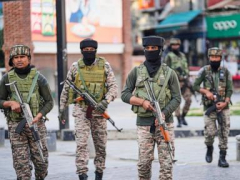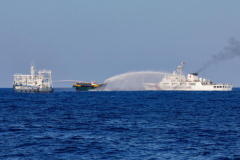ISLAMABAD, Pakistan — ISLAMABAD, Pakistan (AP) — India and Pakistan have fought three full-scale wars since they gained independence from Britain in 1947. They’ve also had dozens of skirmishes and conflicts, including one atop a glacier dubbed the coldest and highest-altitude battlefield in the world.
The latest escalation follows a deadly gun attack on tourists that India blames Pakistan for — Islamabad denies any connection. But they don’t fight wars like other countries.
The dominant factor is their nuclear weapons arsenal, a distinct way of deterring major attacks and a guarantee that fighting doesn’t get out of hand, even when the situation is spiraling.
Here’s how — and why — India and Pakistan fight the way they do:
“Pakistan and India have enough nuclear weapons to wipe the other side out several times over,” says security analyst Syed Mohammed Ali, who is based in Islamabad, the Pakistani capital. “Their nuclear weapons create a scenario for mutually assured destruction.”
Both countries have “deliberately developed” the size and range of their stockpile to remind the other about the guarantee of mutually assured destruction, he adds.
Neither country discloses their nuclear capabilities but each is thought to have between 170 and 180 warheads that are short-, long- and medium-range. Both countries have different delivery systems — ways of launching and propelling these weapons to their targets.
The arsenals are a defensive move to prevent and deter further fighting, because “neither side can afford to initiate such a war or hope to achieve anything from it,” Ali says.
It might not look this way to the outsider, but nuclear weapons are a reminder to the other side that they can’t take things too far.
But the secrecy around their arsenals means that it’s unclear if Pakistan or India can survive a first nuclear strike and retaliate, something called “second-strike capability.”
This capacity stops an opponent from attempting to win a nuclear war through a first strike by preventing aggression that could lead to nuclear escalation.
Without this capability, there is, in theory, nothing to stop one side from launching a warhead at the other.
India and Pakistan have each laid claim to Kashmir since 1947, when both gained independence, and border skirmishes have created instability in the region for decades. Each country controls a part of Kashmir, which is divided by a heavily militarized border.
The two archrivals have also fought two of their three wars over Kashmir — a d




